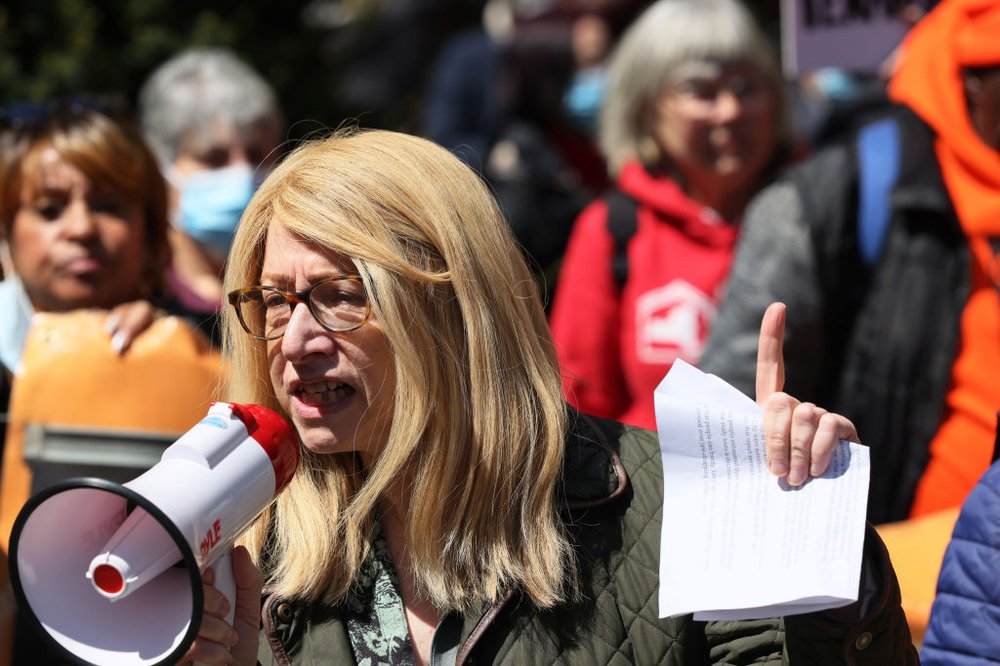New York lawmakers vow insurance industry crackdown after Gothamist investigation
July 27, 2023, 6:30 a.m.
The lawmakers said they will introduce bills prohibiting insurers from asking landlords whether they accept tenants with housing vouchers and denying coverage for subsidized housing.

Three New York lawmakers say they plan to introduce legislation prohibiting property insurers from requesting information about tenant incomes and rental subsidies following a Gothamist investigation into a pervasive practice affecting affordable housing in the five boroughs.
Gothamist’s review of dozens of property and liability insurance applications and interviews with various brokers, landlords and fair housing groups found that insurance carriers operating in New York explicitly ask owners if they house tenants with subsidies — like the federal Section 8 and municipal CityFHEPS programs— and then decline to cover those who do. Property owners are barred from rejecting tenants because they pay the rent with housing vouchers — a practice known as “source of income discrimination” — but no such limits exist for insurance companies.
In response, Assembly Housing Committee Linda Rosenthal, Senate Housing Chair Brian Kavanagh and Assembly Insurance Committee Chair David Weprin all pledged to introduce legislation that prohibits insurers from using tenant source of income to make coverage decisions.
“This kind of behavior cements decades-old stereotypes and we should have moved away from that kind of practices years ago,” Rosenthal (D-Manhattan) said. “It's really reprehensible.”
Fair housing groups have sued insurance carriers over the practice elsewhere in the country, reaching settlements after demonstrating that refusing to underwrite subsidized housing has a disparate impact on people of color, people with disabilities and women-headed households, all of whom are protected classes under federal law. California law explicitly bans insurers from asking questions about tenants’ source of income.
In New York City, those same protected classes account for the vast majority of housing voucher recipients.
“It’s blatantly unfair,” Rosenthal said. “We have so many problems with landlords not accepting vouchers, but this rises to another level.”
Landlords and brokers who spoke with Gothamist said they are forced to scramble to find insurance coverage after receiving rejections and often pay far higher premiums for coverage if they accept housing vouchers.
A State Department Financial Services report found insurance rates increased an average of 43% on subsidized, income-restricted and other affordable apartments between 2019 and 2021.
Owners say those cost increases account for a larger proportion of their overall expenses and discourage repairs and maintenance. In some cases, the landlords may even pass the higher costs onto tenants in the form of rent increases.
“The only people who stand to profit here are insurance companies,” Rosenthal said. “Landlords who do the right thing are being penalized. Tenants who need homes are essentially being redlined. And so in the state legislature, we have to put an end to it.”
Kavanagh (D-Manhattan) said he would take up new legislation in the Senate this upcoming legislative session, slated to begin in January, to ban questions around tenant subsidies.
He said questions around the physical condition of properties or location, such as proximity to a flood zone, are valid for underwriting purposes, but questioned how insurers use tenant characteristics to make their decisions.
“I haven’t heard a coherent explanation of why this is necessary from a business perspective and why this is permissible and not a violation of fair housing laws,” Kavanagh said. “This seems to be an instrument that is both blunt and discriminatory and I don’t think this falls within the bounds of acceptable behavior.”
Housing voucher programs are intended to allow low-income renters to find apartments anywhere in the city, or in the case of Section 8, the country, and in theory have no relation to housing conditions, Kavanagh said. But in practice, he said, Section 8 and other subsidies carry a stigma related to race, poverty and housing quality.
Kavanagh said he talked with landlords of “brand new buildings built to code” who accept housing vouchers, but still face rejection from insurers.
In recent years, the state and city enacted laws prohibiting source of income discrimination by landlords and agents who refuse to rent to New Yorkers with housing subsidies. Two years ago, Kavanagh sponsored legislation to require the state’s Department of Financial Services and its housing agency, known as Homes and Community Renewal, to study underwriting practices and policies by insurers in the property and liability market.
At the end of the last legislative session, Kavanagh introduced a bill prohibiting carriers from refusing to cover buildings because they contain units for low-income New Yorkers. He said he would introduce legislation that also prohibits questions about tenant subsidies.
“It’s the natural extension of our basic principles here to ban this practice,” he said.
And Weprin(D-Queens), the head of the insurance committee, said he is also planning to introduce the Assembly version of Kavanagh’s earlier bill, while working with colleagues on legislation banning subsidy questions.
“This is clearly another form of discrimination and I think it’s outrageous and unacceptable and we have do something about it legislatively,” he said.
A spokesperson for the state’s Department of Financial Services, which oversees the insurance industry, said the agency will provide technical assistance to lawmakers addressing the issue.
Gov. Kathy Hochul’s spokesperson Justin Henry said the governor “remains committed to rooting out discrimination in housing” and will work with lawmakers to enforce fair housing laws.”
This story has been updated with comment from Governor Kathy Hochul's spokesperson.
Insurance companies routinely deny NYC buildings with subsidized tenants